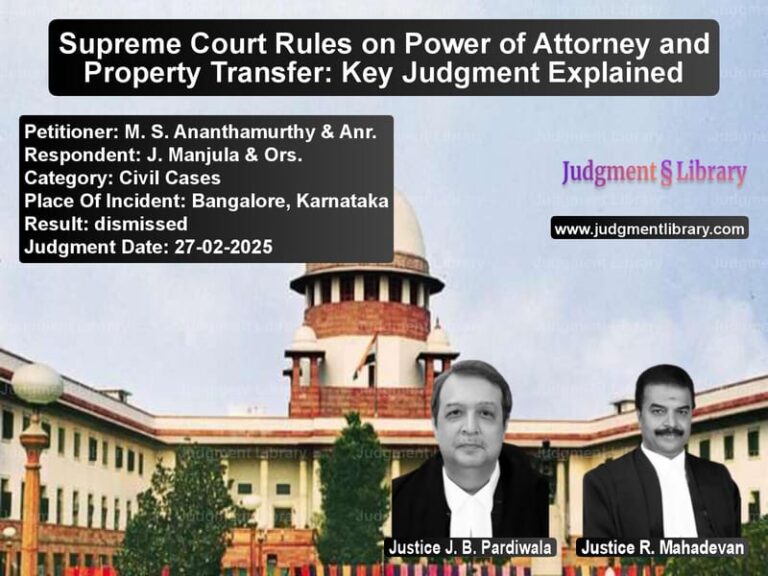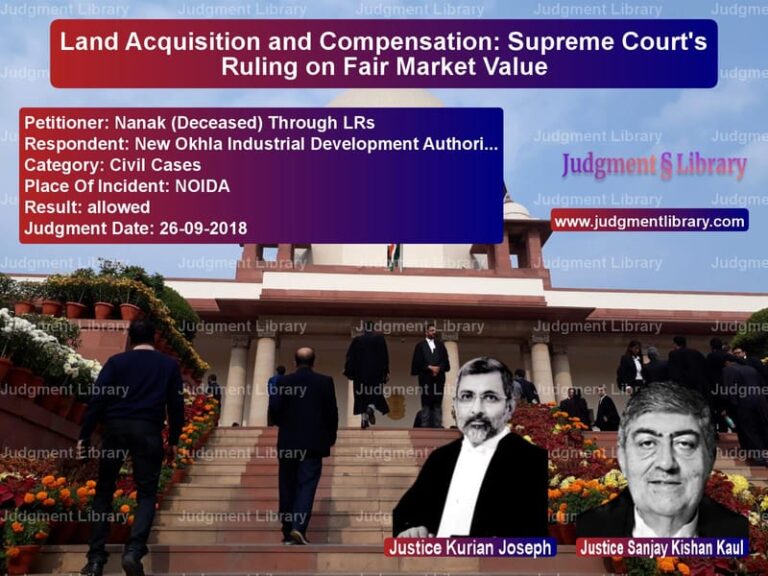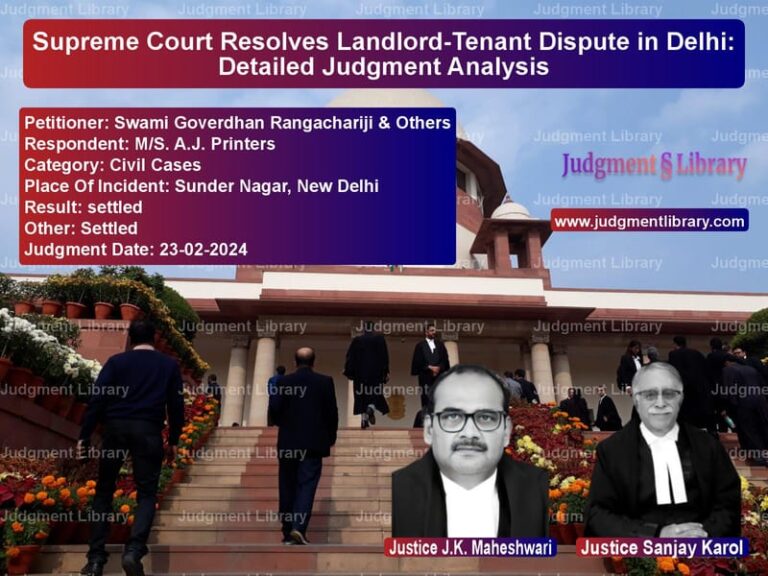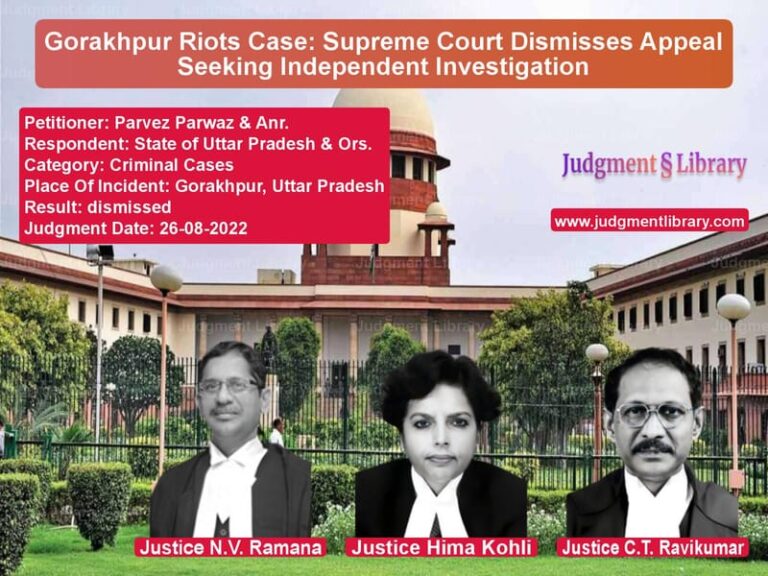Contempt of Court and Execution of Stay Orders: Supreme Court’s Analysis in Amit Kumar Das vs. Hutheesingh Tagore Charitable Trust
The Supreme Court of India, in its judgment dated 30 January 2024, addressed the critical issue of contempt jurisdiction under Article 215 of the Constitution of India and the Contempt of Courts Act, 1971, in the case of Amit Kumar Das, Joint Secretary, Baitanik vs. Shrimati Hutheesingh Tagore Charitable Trust. The judgment examined whether a High Court, while dealing with a contempt petition, could vacate an interim stay order granted in a pending appeal.
Background of the Case
The case originates from a suit filed by the Hutheesingh Tagore Charitable Trust (plaintiff) before the 3rd Civil Judge (Senior Division), Alipore, seeking declaration of title, recovery of possession, and damages for premises occupied by Baitanik, a registered society (defendant). The suit was decreed in favor of the Trust on 25 February 2009, and execution proceedings commenced on 30 July 2009.
The Society appealed against the decree before the Calcutta High Court (F.A.T. No. 321 of 2009, later renumbered as F.A. No. 229 of 2009). On 3 March 2010, the High Court granted an interim stay of execution, subject to conditions, including:
- The Society must deposit Rs. 10 lakhs within 8 weeks with the Registrar General of the High Court.
- Monthly occupation charges of Rs. 35,000 must be deposited until the appeal was decided.
- The Society must maintain status quo regarding possession, nature, and character of the property.
- No third-party rights, including subletting or licenses, could be created on the property.
Violation of Stay Order and Contempt Proceedings
The Trust later alleged that the Society had violated the stay order by renting out parts of the suit premises for exhibitions under the pretense of receiving “donations.” The matter was investigated, and a police report confirmed that an exhibition was held at the premises, with a payment of Rs. 6,000 being made to the Society as “donation.” This led the Trust to file a contempt petition (C.P.A.N. 2113 of 2013) before the Calcutta High Court.
A Division Bench of the High Court found that the Society had willfully violated the stay order by permitting third-party use of the premises. However, rather than initiating contempt proceedings, the Bench vacated the stay order, making the decree executable.
Appeal to the Supreme Court
Amit Kumar Das, on behalf of the Society, challenged the High Court’s decision in the Supreme Court. His arguments were:
- The High Court exceeded its contempt jurisdiction by vacating the stay order instead of punishing for contempt.
- The Trust had not sought vacating of the stay order in the appeal proceedings, making such a move improper.
The Trust countered that:
- The stay order had already lapsed as the Society failed to make required deposits.
- The Society had not paid occupation charges since February 2020.
- The violation of the stay order justified its vacation.
Supreme Court’s Analysis and Judgment
The Supreme Court, while acknowledging the violation, held that contempt jurisdiction should not have been used to vacate the stay order. The Court relied on key precedents, including:
- Sudhir Vasudeva vs. M. George Ravishekaran (2014) 3 SCC 373: Courts must not exceed contempt jurisdiction by passing supplemental orders.
- Baranagore Jute Factory PLC. Mazdoor Sangh vs. Baranagore Jute Factory PLC (2017) 5 SCC 506: Courts can pass restitutive orders but must ensure they align with contempt law.
- Delhi Development Authority vs. Skipper Construction Co. (1996) 4 SCC 622: Courts can ensure contemnors do not benefit from their disobedience.
The Supreme Court ruled that while the Society’s actions amounted to contempt, the High Court’s decision to vacate the stay order was legally flawed. Instead, contempt proceedings should have been initiated.
Read also: https://judgmentlibrary.com/supreme-court-restores-land-acquisition-case-after-32-year-legal-battle/
The Court directed:
- Setting aside the High Court’s order vacating the stay, restoring the earlier status.
- Remanding the matter to the High Court for proper contempt proceedings.
- Allowing the Trust to take legal steps to vacate the stay through appropriate channels.
Impact of the Judgment
This judgment reinforces that contempt jurisdiction cannot be used as a substitute for appellate review. It establishes that:
- Contempt proceedings should focus on punishment for disobedience, not modifying or vacating existing orders.
- Execution of a decree should follow proper appellate procedures, not be indirectly achieved through contempt rulings.
- Courts must ensure that contemnors do not benefit from their violations while staying within legal boundaries.
Conclusion
The Supreme Court’s ruling in this case provides an important precedent on the limits of contempt jurisdiction and the appropriate procedural path for seeking relief. While the Society was found guilty of contempt, the High Court’s approach was deemed incorrect. By restoring the original legal framework and directing contempt proceedings, the judgment upholds judicial discipline while protecting the sanctity of stay orders.
Petitioner Name: Amit Kumar Das.Respondent Name: Shrimati Hutheesingh Tagore Charitable Trust.Judgment By: Justice Aniruddha Bose, Justice Sanjay Kumar.Place Of Incident: Kolkata.Judgment Date: 30-01-2024.
Don’t miss out on the full details! Download the complete judgment in PDF format below and gain valuable insights instantly!
Download Judgment: amit-kumar-das-vs-shrimati-hutheesingh-supreme-court-of-india-judgment-dated-30-01-2024.pdf
Directly Download Judgment: Directly download this Judgment
See all petitions in Contempt Of Court cases
See all petitions in Property Disputes
See all petitions in Specific Performance
See all petitions in Contract Disputes
See all petitions in Legal Malpractice
See all petitions in Judgment by Aniruddha Bose
See all petitions in Judgment by Sanjay Kumar
See all petitions in partially allowed
See all petitions in Remanded
See all petitions in supreme court of India judgments January 2024
See all petitions in 2024 judgments
See all posts in Civil Cases Category
See all allowed petitions in Civil Cases Category
See all Dismissed petitions in Civil Cases Category
See all partially allowed petitions in Civil Cases Category







